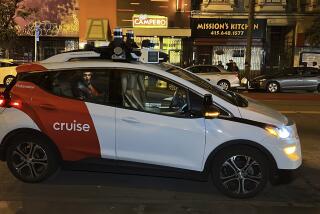Suzuki Will Put Safety Warnings in Samurai Ads
- Share via
American Suzuki Motor Corp. has agreed to pay $200,000 to California and six other states and to include a warning statement about the handling of its Samurai sport utility vehicle in all future advertising. The settlement announced Thursday comes after nearly 10 months of criticism about the Samurai’s safety.
The settlement also requires that Suzuki’s new Sidekick model, which is generally considered a safer vehicle and has not been the focus of controversy, carry a warning label in all print advertisements that the vehicle handles differently from ordinary passenger cars.
The Sidekick warning came as a surprise to auto industry experts and may have repercussions on the rapidly growing market for sport utility vehicles. General Motors, which buys the Sidekick from Suzuki and sells it as a Chevrolet Geo Tracker, is not mentioned in the agreement. It could not be learned Thursday whether the states plan to take action against General Motors and require it to include warnings.
“The Sidekick has passed tests and is a great improvement on the Samurai,” said Chris Cedergren, an auto industry analyst at J. D. Power & Associates, an Agoura Hills auto consulting firm. “I don’t know what this will mean for sport utility vehicles.”
Cedergren said that, over the next two years, Chrysler, Nissan and other auto makers plan to begin selling models similar to the Sidekick.
The agreement settles lawsuits filed by California, New York, Massachusetts, Minnesota, Missouri, Texas and Washington, accusing American Suzuki--the U.S. distribution and marketing arm of Japanese auto maker Suzuki--of false and deceptive advertising. It took effect Tuesday.
Samurai television and radio ads and Sidekick print ads must now include the following statement: “This vehicle handles differently from ordinary passenger cars. Federal law cautions to avoid sharp turns and abrupt maneuvers.” Samurai print ads also must state that such maneuvers “can cause vehicles of this type to roll over.”
Brea-based American Suzuki entered the agreement without admitting any guilt or safety problems. The $200,000 payment covers the states’ investigative costs.
“This agreement strongly affirms that the Samurai is a safe vehicle,” N. Douglas Mazza, American Suzuki’s vice president, said in a statement.
California Atty. Gen. John K. Van de Kamp said: “Suzuki’s ads had promoted the Samurai as a safe, ‘good times’ toy, but our investigation revealed the contrary.”
The states began investigating the Samurai’s safety last June after Consumer Reports magazine gave the popular four-wheel-drive vehicle its first “not acceptable” rating in 10 years.
Consumers Union, publisher of Consumer Reports, said the $8,500 Samurai is too short, too narrow, too light and its center of gravity is too high to be safe.
Sales for the model had been averaging about 6,000 vehicles a month but fell to about 1,000 in July. Sales recovered to more than 12,000 units in August, after a heavy promotional and incentive program by Suzuki. Since then, sales have fallen, partly because of the introduction of the more expensive Sidekick in September.
Nearly 60,000 Samurais have been sold during the company’s fiscal 1989, which ends March 31. But only about 12,000 vehicles are expected to be sold in the next fiscal year. The company expects to sell 50,000 Sidekick models during the next year.
“We have gone from a one-product company to a several-product company. The promotional and sales effort for the Samurai reflect this,” Suzuki spokeswoman Laura Segall said.
She said there are no plans to halt sales of the vehicle in the United States or for the parent company to stop making the model.






